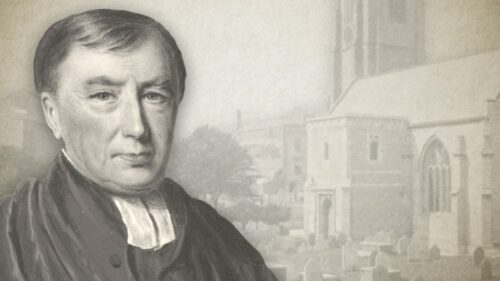
April 15—Morning Devotion
“And when Jesus had cried with a loud voice, he said, Father, into thy hands I commend my spirit: and having said thus, he gave up the ghost.”—Luke 23:46
My soul, ponder well these last of the last seven words of thy God and Saviour which he uttered on the cross; for surely they are most sweet and precious, and highly interesting, both on thy Saviour’s account and thine own. And first remark, the manner in which the Lord Jesus thus breathed out his soul; not like a man spent and exhausted, after hanging so many hours on the cross, faint with loss of blood, and such agonies of soul as never one before endured; but it was with a loud voice, thereby proving what he had before declared—”No man taketh my life from me; I have power to lay it down, and I have power to take it again.” Precious Jesus, how sweet this assurance to thy people. But wherefore cry with a loud voice? A whisper, nay, a thought of the soul only, if with an eye of communication to God the Father, would have been sufficient, if this had been all that was intended. Wherefore then did Jesus cry with a loud voice? Was it not that all in heaven, and all in hell might hear? Did not angels shout at the cry? Did not the spirits of just men made perfect among the faithful gone to glory in Jesus’s name, hear, and sing aloud? Did not all hell tremble when Jesus thus cried aloud, conscious that the keys of the grave, and death, and hell, were now put into his Almighty hand? Oh! precious, precious Jesus! was this among thy gracious designs for which, when thou wert retiring from the bloody field of battle, as a conqueror, thy loud voice shouted victory? And was there not another sweet and gracious design in this loud cry, Oh! thou blessed Jesus? Didst thou not intend thereby that poor sinners, unto the ends of the earth, might, by faith, hear and believe to the salvation of their souls? Didst thou not, dearest Lord! when bowing thy sacred head, as if to take a parting look of the disciple and the Marys, at the foot of the cross, and beholding them as the representatives of all the members of thy mystical body, didst cry with a loud voice, that all with them might behold thy triumphs, and rejoice in thee their glorious Head? Yes, Lamb of God! we adore thee in this glorious act; for we do accept it as it really is, the act of our one glorious head. In this solemn committing of thy spirit to the Father, we consider our spirits also as committed with thee, and by thee. (My soul! mark this down carefully in. the inmost tablet of thine heart.) In all this, blessed Jesus! thou wert, and art, our Head. Thou didst, to all intents and purposes, take every individual believer of thine as a part of thyself, and by this act didst commit, with thyself, the whole into thy Father’s hands, to be kept until the hour of their dropping their bodies, then to be united to thee for ever. Oh! precious Jesus! O precious mercy of our Jesus, how safe, how eternally safe, and secure, are all thy redeemed! Well might thine apostle say, “No man liveth to himself, and no man dieth to himself; for in Jesus his people ever live, and in Jesus they securely die.” Henceforth, dear Lord! let me know myself to be already committed with thee, and by thee, into the hands of my God and Father in Jesus, and when the hour cometh that the casket, in which that precious jewel, my soul, now dwells, is opened for the soul to take her departure, O then for faith in lively, active, earnest faith, to follow the example, and to adopt the very language of my God and Saviour; and to cry out—”Lord Jesus, into thy hands I commend my spirit; for thou hast redeemed me, O Lord, thou God of truth!”
Robert Hawker (1753-1827) was an Anglican (High-Calvinist) preacher who served as Vicar of Charles Church, Plymouth. John Hazelton wrote of him:
“The prominent features…in Robert Hawker's testimony…was the Person of Christ….Dr. Hawker delighted to speak of his Lord as "My most glorious Christ.” What anxious heart but finds at times in the perusal of the doctor's writings a measure of relief, a softening, and a mellowing? an almost imperceptible yet secret and constraining power in leading out of self and off from the misery and bondage of the flesh into a contemplation of the Person and preciousness of Christ as "the chiefest among ten thousand and the altogether lovely." Christ and Him crucified was emphatically the burden of his song and the keynote of his ministry. He preached his last sermon in Charles Church on March 18th, 1827, and on April 6th he died, after being six years curate and forty-three years vicar of the parish. On the last day of his life he repeated a part of Ephesians 1, from the 6th to the 12th verses, and as he proceeded he enlarged on the verses, but dwelt more fully on these words: "To the praise of His glory Who first trusted in Christ." He paused and asked, "Who first trusted in Christ?" And then made this answer: "It was God the Father Who first trusted in Christ."
Robert Hawker on the Biblical Covenants (Complete)
Robert Hawker's Poor Man's Morning Portions





